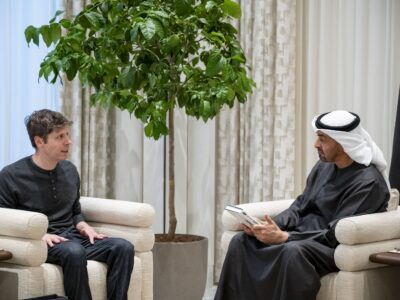British firms are eyeing UAE healthcare opportunities as the sector rapidly digitalises following the pandemic.
This summer, the region’s largest health event Arab Health showcased some of the world’s top digital health solutions in Dubai – including those from British companies.
As a frontrunner in digital solutions, the UK has pioneered healthcare innovation by introducing and testing solutions in the National Health Service (NHS) – the world’s largest single-payer universal healthcare system.
At a recent roundtable hosted by Dubai-based British Business Group (BBG), regional experts discussed digital health export opportunities for UK companies into the UAE.
“There is now a major global focus on digitising the patient journey through the lifecycle,” said Dr. Mazin Gadir, director of partnerships, bid management and client relationships at IQVIA, at the BBG panel.
Gadir added that a lack of regional data maturity, transparency and utilisation has opened up trade opportunities for digital health companies
“R&D around digital healthcare and data management is still quite nascent in the Gulf,” said Gadir.
Gadir (below) also predicted that specialised technologies, for areas such as chronic disease management and geriatrics, would be in demand as the UAE expat population resides in the country past retirement age as visa rules are relaxed.

Preventative healthcare
David Hadley, Middle East CEO of London-listed Mediclinic, the largest private healthcare clinic in the region, said the Gulf is moving towards an era where healthcare is preventative rather than reactive.
“This new approach will be driven by e-records and digitisation, which will allow us to plan health pathways better. In the future, most chronic diseases will be managed from home via wearable technology,” Hadley said.
“The Gulf has such a young population; they are tech-savvy and have a vested interest in lifespan extension and the science of anti-ageing. There is a lot of interest surrounding the use of genetics to improve health,” he added.
Hadley said British digital healthcare and science firms were well placed to support health services in the Gulf.
“The beauty of the Gulf is that is doesn’t have legacy health systems and so can share their information. The government is able to quickly and effectively make data decisions for the long-term benefit of the country.
“There are already many global healthcare companes in the Gulf. The real healthcare opportunities lie in digital and using data to create meaningful pathways,” Hadley (below) said.

Lisa Skinner (below), a board director of the BBG and director at Engine Service Design, said: “For several months now, we’ve co-created with healthcare experts across the public and private sector in the UAE to envision a digitally enabled healthcare experiences that puts the patient in control of their healthcare experience.”
Skinner said that being able to engage experts in the BBG Healthcare Sector Roundtable was a way to bring together experts from healthcare and service design to create digitally-enabled service solutions to solve pain-points and take advantage of opportunities within the current patient experience in the UAE.
“The experts brought together valuable perspectives from both UAE-based British companies and UAE entities,” she said. “This approach highlights the increasing need for collaboration across healthcare providers, legislators, insurers, law makers to come together to deliver a holistic patient journey that empowers users to seamlessly navigate the healthcare system and improve their own health outcomes.”

UK–UAE collaboration
In the last 18 months, British digital healthcare firms have notably been making their mark in the region. In a recent example, UK-founded My Way Digital Health, a remote care firm that helps diabetes sufferers to self-manage symptoms, has begun to pilot its technology in the UAE and is set to open an office in the Emirates this year. Its solutions – which have been translated into Arabic – have improved diabetes prevention and management outcomes in Britain by around 40 per cent.
In another UK-UAE collaboration, Dubai’s Osteopathic Health Centre unveiled the Middle East’s first digital health library in partnership with Britain’s ORCHA (the Organisation for the Review of Care and Health Apps). The new library will enable around 40,000 customers to access a library of apps to help stop smoking, reduce obesity, and provide mental health support.
Hassan Choudhury, global digital health specialist, Healthcare UK, Department for International Trade, has previously said that the emergence of the pandemic raised important questions for Middle East health organisations, such as how to treat patients remotely and how to rapidly scale up capacity – which has increased demand for digital health solutions, such as telemedicine, artificial intelligence (AI), and big data.
Choudhury added that there is “immense opportunity” for UK-UAE partnerships in the digital health space.








